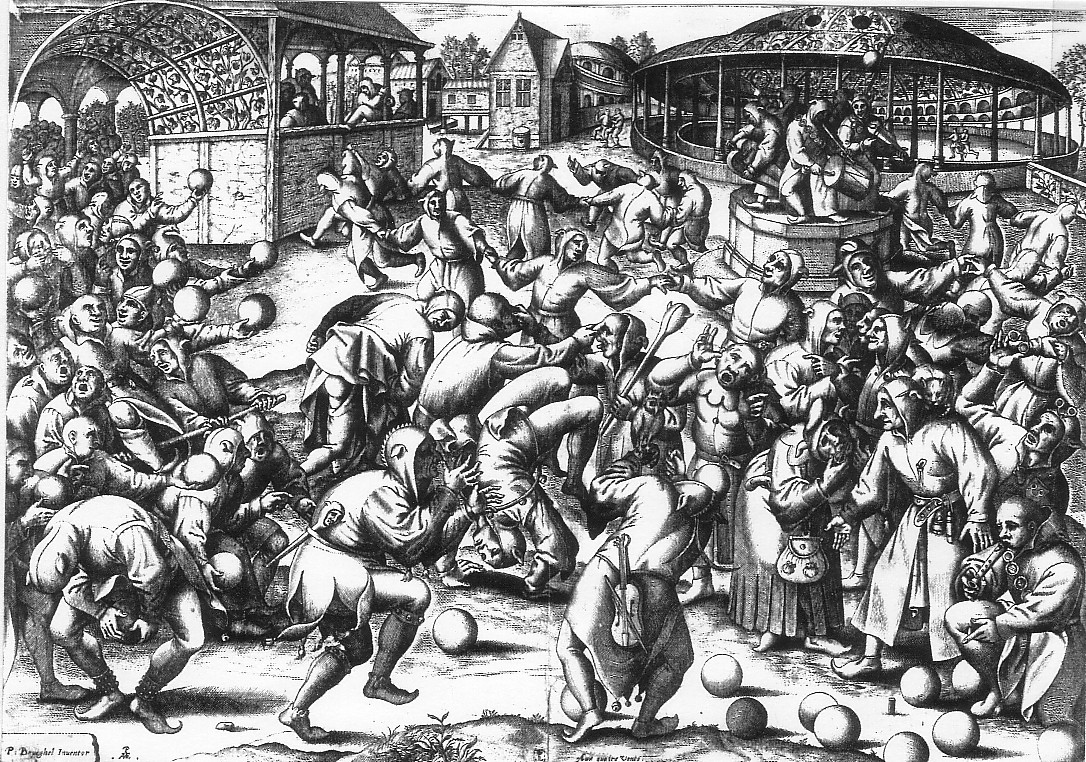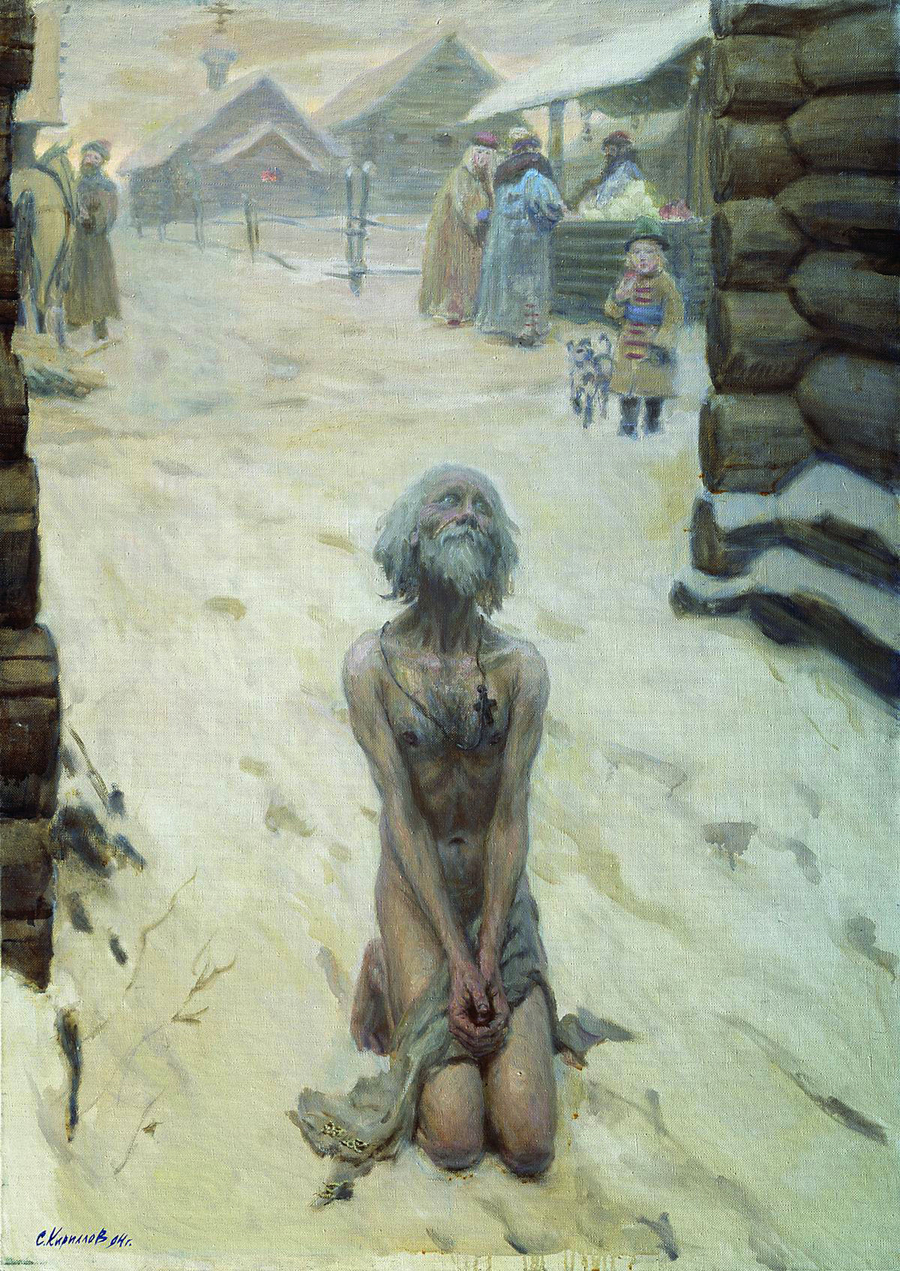|
Roly Bain
David Roualeyn Findlater "Roly" Bain (18 January 1954 – 11 August 2016) was an English priest and clown who preached and performed as Holy Roly. He helped set up the organisation Holy Fools. Early life and education His father was Kenneth Bruce Findlater Bain, a theatre critic who wrote under the name Richard Findlater. His mother was Romany Bain, a freelance journalist. He was one of triplets. He attended St. Paul's School in West London, then read theology at Bristol University and Cuddesdon Theological College. He was ordained an Anglican priest in 1978. In 1990 he spent a year at Fooltime (now Circomedia), a circus training college in Bristol, and became a professional clown. He served in parallel as an associate vicar at St Mary the Virgin Church in Olveston. Career After serving as a parish priest, Bain decided to convey the Christian message through a different route, inspired by his lifelong love of clowns. His father had written a biography of the famous clown Joseph ... [...More Info...] [...Related Items...] OR: [Wikipedia] [Google] [Baidu] |
Priest
A priest is a religious leader authorized to perform the sacred rituals of a religion, especially as a mediatory agent between humans and one or more deities. They also have the authority or power to administer religious rites; in particular, rites of sacrifice to, and propitiation of, a deity or deities. Their office or position is the 'priesthood', a term which also may apply to such persons collectively. A priest may have the duty to hear confessions periodically, give marriage counseling, provide prenuptial counseling, give spiritual direction, teach catechism, or visit those confined indoors, such as the sick in hospitals and nursing homes. Description According to the trifunctional hypothesis of prehistoric Proto-Indo-European society, priests have existed since the earliest of times and in the simplest societies, most likely as a result of agricultural surplus and consequent social stratification. The necessity to read sacred texts and keep temple or church rec ... [...More Info...] [...Related Items...] OR: [Wikipedia] [Google] [Baidu] |
Clown
A clown is a person who performs comedy and arts in a state of open-mindedness using physical comedy, typically while wearing distinct makeup or costuming and reversing folkway-norms. History The most ancient clowns have been found in the Fifth Dynasty of Egypt, around 2400 BC. Unlike court jesters, clowns have traditionally served a socio-religious and psychological role, and traditionally the roles of priest and clown have been held by the same persons. Peter Berger writes, "It seems plausible that folly and fools, like religion and magic, meet some deeply rooted needs in human society." For this reason, clowning is often considered an important part of training as a physical performance discipline, partly because tricky subject matter can be dealt with, but also because it requires a high level of risk and play in the performer. In anthropology, the term ''clown'' has been extended to comparable jester or fool characters in non-Western cultures. A society in which ... [...More Info...] [...Related Items...] OR: [Wikipedia] [Google] [Baidu] |
2016 Deaths
This is a list of deaths of notable people, organised by year. New deaths articles are added to their respective month (e.g., Deaths in ) and then linked here. 2022 2021 2020 2019 2018 2017 2016 2015 2014 2013 2012 2011 2010 2009 2008 2007 2006 2005 2004 2003 2002 2001 2000 1999 1998 1997 1996 1995 1994 1993 1992 1991 1990 1989 1988 1987 See also * Lists of deaths by day The following pages, corresponding to the Gregorian calendar, list the historical events, births, deaths, and holidays and observances of the specified day of the year: Footnotes See also * Leap year * List of calendars * List of non-standard ... * Deaths by year {{DEFAULTSORT:deaths by year ... [...More Info...] [...Related Items...] OR: [Wikipedia] [Google] [Baidu] |
Hector McDonnell
The Hon. Hector John McDonnell (born 1947) is a Northern Irish painter, etcher, and author, specializing in architectural art, landscape, and portrait work. Early life A younger son of Randal McDonnell, 8th Earl of Antrim, by his marriage to the sculptor Angela Sykes, and the younger brother of Alexander McDonnell, Hector McDonnell was born in Belfast. He grew up on the family estate at Glenarm, County Antrim, Northern Ireland, and was educated at Eton and Christ Church, Oxford, where he read modern history. In 1965 and 1966, before going up to Oxford, he studied painting in Munich and Vienna.Biography at hectormcdonnell.com, accessed 8 September 2019 Artistic career McDonnell lives and works in Northern Ireland and New York, but maintains close links with Germany. In 1979, he was the winner of the ''Darmstädter Kunstpreis' ...[...More Info...] [...Related Items...] OR: [Wikipedia] [Google] [Baidu] |
Court Jester
A jester, court jester, fool or joker was a member of the household of a nobleman or a monarch employed to entertain guests during the medieval and Renaissance eras. Jesters were also itinerant performers who entertained common folk at fairs and town markets, and the discipline continues into the modern day, where jesters perform at historical-themed events. During the Middle Ages, jesters are often thought to have worn brightly colored clothes and eccentric hats in a motley pattern. Their modern counterparts usually mimic this costume. Jesters entertained with a wide variety of skills: principal among them were song, music, and storytelling, but many also employed acrobatics, juggling, telling jokes (such as puns, stereotypes, and imitation), and performing magic tricks. Much of the entertainment was performed in a comic style. Many jesters made contemporary jokes in word or song about people or events well known to their audiences. Etymology The modern use of the English ... [...More Info...] [...Related Items...] OR: [Wikipedia] [Google] [Baidu] |
Marc Abrahams
Marc Abrahams is the editor and co-founder of '' Annals of Improbable Research'', and the originator and master of ceremonies of the annual Ig Nobel Prize celebration. He was formerly editor of the ''Journal of Irreproducible Results''. Abrahams is married to Robin Abrahams, also known as "Miss Conduct", a columnist for the ''Boston Globe''. He graduated from Harvard College with a degree in applied mathematics. Bibliography Books written or edited by Abrahams include: * ''This Is Improbable'' () * ''The Ig Nobel Prizes'' () * ''Why Chickens Prefer Beautiful Humans'' () * ''Sex As a Heap of Malfunctioning Rubble'' () * ''The Best of "Annals of Improbable Research"'' () * ''The Man Who Tried to Clone Himself'' () References External links Annals of Improbable Research(Abrahams' own account of JIR and AIR), ''The Guardian ''The Guardian'' is a British daily newspaper. It was founded in 1821 as ''The Manchester Guardian'', and changed its name in 1959. Along with ... [...More Info...] [...Related Items...] OR: [Wikipedia] [Google] [Baidu] |
Journal Of Religion And Health
The ''Journal of Religion and Health'' (JORH) is an interdisciplinary peer-reviewed academic journal. The journal was founded in 1961 by the Blanton-Peale Institute and published by Springer Science+Business Media Springer Science+Business Media, commonly known as Springer, is a German multinational publishing company of books, e-books and peer-reviewed journals in science, humanities, technical and medical (STM) publishing. Originally founded in 1842 in .... The JORH is one of the oldest journals covering religion, psychology, spirituality and health. Abstracting and indexing The journal is abstracted and indexed by in the following bibliographic databases: References External links * {{DEFAULTSORT:Journal of Religion and Health Publications established in 1961 Religious studies journals Healthcare journals Springer Science+Business Media academic journals Quarterly journals English-language journals Religion and health ... [...More Info...] [...Related Items...] OR: [Wikipedia] [Google] [Baidu] |
Paul The Apostle
Paul; grc, Παῦλος, translit=Paulos; cop, ⲡⲁⲩⲗⲟⲥ; hbo, פאולוס השליח (previously called Saul of Tarsus;; ar, بولس الطرسوسي; grc, Σαῦλος Ταρσεύς, Saũlos Tarseús; tr, Tarsuslu Pavlus; la, Paulus Tarsensis AD), commonly known as Paul the Apostle and Saint Paul, was a Christian apostle who spread the teachings of Jesus in the first-century world. Generally regarded as one of the most important figures of the Apostolic Age, he founded several Christian communities in Asia Minor and Europe from the mid-40s to the mid-50s AD. According to the New Testament book Acts of the Apostles, Paul was a Pharisee. He participated in the persecution of early disciples of Jesus, possibly Hellenised diaspora Jews converted to Christianity, in the area of Jerusalem, prior to his conversion. Some time after having approved of the execution of Stephen, Paul was traveling on the road to Damascus so that he might find any Christians ... [...More Info...] [...Related Items...] OR: [Wikipedia] [Google] [Baidu] |
Middle Ages
In the history of Europe, the Middle Ages or medieval period lasted approximately from the late 5th to the late 15th centuries, similar to the post-classical period of global history. It began with the fall of the Western Roman Empire and transitioned into the Renaissance and the Age of Discovery. The Middle Ages is the middle period of the three traditional divisions of Western history: classical antiquity, the medieval period, and the modern period. The medieval period is itself subdivided into the Early, High, and Late Middle Ages. Population decline, counterurbanisation, the collapse of centralized authority, invasions, and mass migrations of tribes, which had begun in late antiquity, continued into the Early Middle Ages. The large-scale movements of the Migration Period, including various Germanic peoples, formed new kingdoms in what remained of the Western Roman Empire. In the 7th century, North Africa and the Middle East—most recently part of the Eastern Ro ... [...More Info...] [...Related Items...] OR: [Wikipedia] [Google] [Baidu] |
Feast Of Fools
Feast of Fools The Feast of Fools or Festival of Fools (Latin: ''festum fatuorum, festum stultorum'') was a feast day on January 1 celebrated by the clergy in Europe during the Middle Ages, initially in Southern France, but later more widely. During the Feast, participants would elect either a false Bishop, false Archbishop, or false Pope. Ecclesiastical ritual would also be parodied, and higher and lower-level clergy would change places. The lack of surviving documents or accounts, as well as changing cultural and religious norms, has considerably obscured the modern understanding of the Feast, which originated in proper liturgical observance, and has more to do with other examples of medieval liturgical drama. Though there is some connection with the earlier pagan (Roman) feasts of Saturnalia and Kalends or the later bourgeois in Sotie. Over the course of a week, the ceremonies would be led by different people in positions of power within the church. On December 26, St. Stephen ... [...More Info...] [...Related Items...] OR: [Wikipedia] [Google] [Baidu] |
Foolishness For Christ
Foolishness for Christ ( el, διά Χριστόν σαλότητα, cu, оуродъ, юродъ) refers to behavior such as giving up all one's worldly possessions upon joining an ascetic order or religious life, or deliberately flouting society's conventions to serve a religious purpose—particularly of Christianity. Such individuals have historically been known as both "holy fools" and "blessed fools". The term "fool" connotes what is perceived as feeblemindedness, and "blessed" or "holy" refers to innocence in the eyes of God.Frith, Uta. (1989) Autism: The Elegant Enigma. Malden, MA: Blackwell Publishing. The term ''fools for Christ'' derives from the writings of Saint Paul. Desert Fathers and other saints acted the part of Holy Fools, as have the ''yurodivy'' (or iurodstvo) of Eastern Orthodox asceticism. Fools for Christ often employ shocking and unconventional behavior to challenge accepted norms, deliver prophecies, or to mask their piety.Parry (1999), p. 233 Old Test ... [...More Info...] [...Related Items...] OR: [Wikipedia] [Google] [Baidu] |



.jpg)


